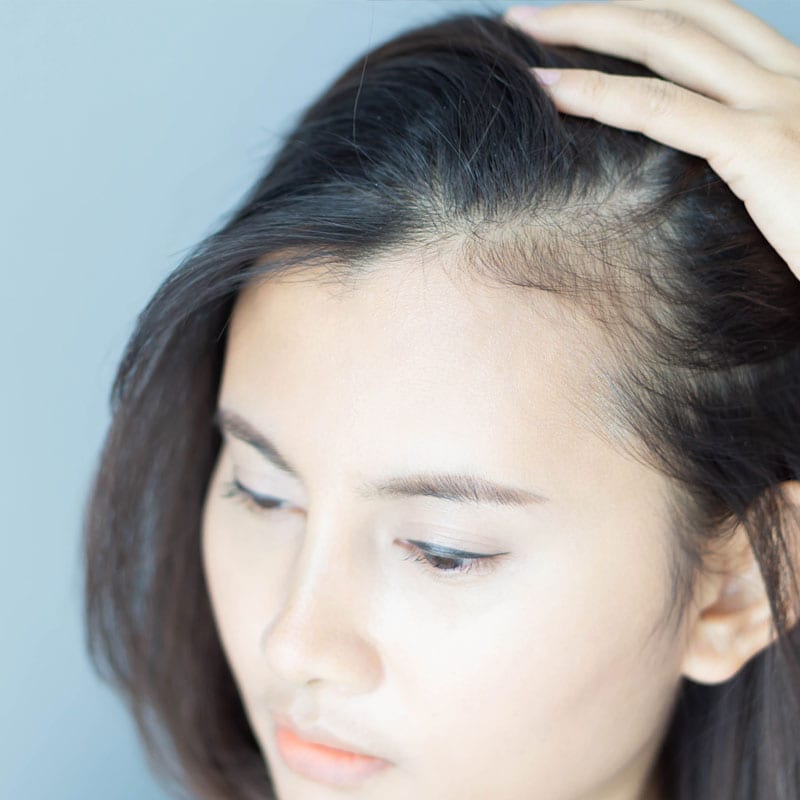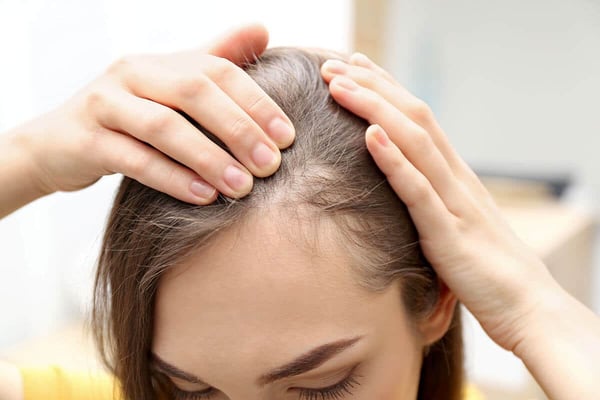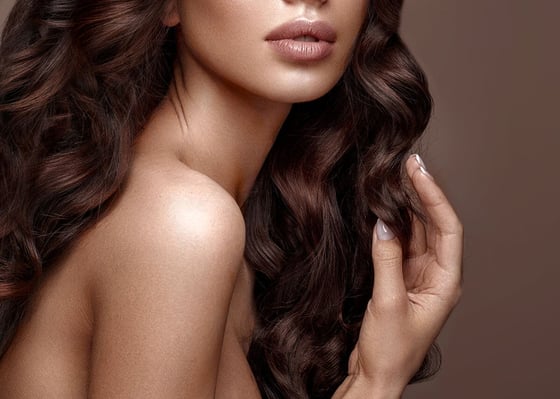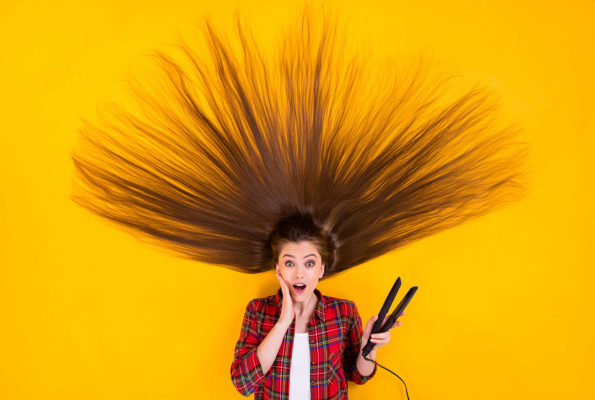Guide To Getting Thick Hair With Hair Products for Thin Hair
Do you use hair products for thin hair? If so, you may not be looking for the right items.
Colloquially, “thin” hair can mean strands that are fine and more prone to breakage. If this describes your hair, then there are many volumizing shampoos that can plump the cuticle for thicker strands.
However, there’s another definition of “thin” hair: strands that aren’t densely packed on the scalp. Hair products for thin hair of this type have a very different approach than those formulated for fine hair.
So how can you tell if your hair is thinning instead of fine? What can you do to thicken thinning hair?
Fortunately, there are many things you can do to fix this issue. First, let’s look at the signs of thinning hair.

If you suspect you have thinning hair, you should start looking for warning signs. If you catch the problem early enough, you can prevent further hair loss with the best products for thin fine hair.
Loosened Hair
Are you seeing more hair on your brush than usual? You may be experiencing loosened hair.
Loosened hair doesn’t necessarily fall out on its own, but it’s much easier to remove than it should be. You may see more hair going down the drain when you shampoo or even have strands come out when you run your fingers through your hair.
If you see this happening, it’s essential that you be gentle and try to avoid touching your hair as much as possible. The good news is, this type of hair loss is usually temporary and doesn’t mean you’re going to go bald.
Circular Bald Spots
Certain kinds of hair loss aren’t evenly distributed across the scalp. Instead, you may see patches where hair has fallen out or grown thin.
In this case, you may need special hair products for thin hair, especially if you notice bald patches in other areas, such as your eyebrows or facial hair. You should also take note of any itching or irritation you experience, as this often happens before hair loss in an area.
Gradual Thinning
Gradual thinning is probably the type of hair loss people are most familiar with. It describes the receding hairline, which many men experience as part of male pattern baldness.
However, women can also experience gradual thinning. This usually happens along their parting, though they can also experience a receding hairline.

The best thing to do is to look at each of these factors in turn and decide if they apply to your situation. If changing your lifestyle and using the best products for thin fine hair don’t work, you may need to see a doctor, as thinning hair can be a symptom of certain medical conditions.
It’s also important to note that for many people, thinning hair is a natural part of aging. Of course, that doesn’t mean you have to accept it — there are many options out there to help you regain a full head of hair.
Hair Styling
Hair styles that put a lot of stress on strands, such as tight ponytails, can lead to hair loss. Constant tugging on strands damages follicles, making your hair brittle.
This issue is especially relevant if you have fine hair that’s already prone to breakage. In that case, you should use the best products for thin fine hair to strengthen strands.
Stress
Stress has a huge impact on the human body that can affect our ability to heal, focus and, it turns out, grow hair. It’s a known cause of hair loss and anyone can experience it.
If you’re under a great deal of stress, your body is essentially in “panic mode.” This means it devotes nutrients and energy to vital functions, which leaves hair growth wanting.
You also experience an influx of stress hormones, which can cause all sorts of problems. One of these is killing new hair. As a result, you can’t replace the hair you naturally lose, leading to thinning.
The good news is, once the stress is alleviated, your hair should start to regrow on its own. Of course, you can help it along by using hair products for thin hair.
Medications
Hair loss is a side effect of some medications and supplements. If you find that your hair is thinner after starting on a new prescription, research to find out if that’s one of the known side effects.
Radiation Therapy
Many people are already familiar with hair loss as a side effect of chemotherapy and other radiation therapies. If your hair is thinning due to this treatment, know that once treatment ends, it will grow back.
Medical Conditions
There are several medical conditions that either directly or indirectly cause hair loss. Depending on which you have, hair products for thin hair may or may not help. Here are some of the most common health problems tied to thinning hair:
- Ringworm: This condition is actually a fungal infection that causes redness, irritation and itching. When it occurs on the scalp, it can also lead to bald patches.
- Thyroid Disease: Your thyroid is responsible for producing hormones that control many bodily functions, such as your metabolism. When your thyroid isn’t producing the correct hormones, you can experience a variety of symptoms, one of which is thinning hair.
- Alopecia Areata: This is an autoimmune disorder where the body’s immune system attacks hair follicles. People with alopecia areata usually experience hair loss in many places on their bodies, not just the scalp.
- PCOS: Polycystic ovary syndrome is a condition that causes an imbalance in reproductive hormones. It has many symptoms, one of which is hair loss.
Hormone Changes
Hormones have a huge impact on your hair’s growth and health, so it makes sense that changes can affect thinning. For example, pregnant people may experience hair thinning due to the rapid hormone changes caused by pregnancy.
We also experience these changes naturally as we age. For example, post-menopausal women and men with age-related low testosterone may experience hair thinning.
Hormonal birth control can also have an impact on hair fullness. Individuals who stop using hormonal birth control may notice thinner hair as a result.
Genetics
Some people are genetically predisposed for hair loss. This is especially true for male and female pattern baldness.
If members of your family have experienced hair loss as they age, there’s a good chance that you will as well. However, you can combat the effects with certain therapies and hair products for thin hair.
Hair Products
Certain styling and hair care products can cause thinning either as an allergic reaction or due to their harsh chemicals. To avoid allegoric reactions, you should test products on a small patch of skin 48 hours before use.
Chemical treatments known to damage hair can also lead to thinning. Here are a few of the most common culprits:
- Extreme-hold gels and sprays
- Color treatments containing ammonia
- Relaxers
- Perms
Diet
Your body needs certain nutrients to create and maintain healthy hair. If you have loosened strands or lack of new hair growth, it may be related to your diet; to boost follicle creation, try eating more foods with the following:
- Protein
- Folic acid
- Iron
Lifestyle
Some lifestyle choices can lead to decreased hair growth. One of the biggest is smoking.
Studies show that smoking has an impact on hair loss in men. Of course, smoking has many negative health effects, so hair loss is just one reason to quit among many.

If your hair loss is tied to medication or a health condition, it’s crucial that you discuss the problem with your doctor. Otherwise, there are many home remedies you can try; the key to getting fuller hair may be as easy as using hair products for thin hair.
Laser Therapy
Lasers are well-known for getting rid of unwanted hair permanently, but did you know they can also be used to promote hair growth? Laser therapy is quick, requires no recovery time and can cause hair to regrow thicker.
For a long time, you could only get this treatment at a clinic. However, there are now at-home laser products that allow you to do it yourself.
Anti-Androgens
Androgens are a type of hormone associated with the development of male secondary sex characteristics. Everyone has androgens, though the amounts vary based on sex, age and other factors.
In women, a surplus of androgens can lead to hair loss among other symptoms. Anti-androgens can return hormones back to equilibrium.
Prescription Medication
There are a number of medications available that can treat thinning hair. The following are some of the most common:
- Corticosteroids
- Finasteride
- Minoxidil
Omega-6 and Omega-3 Fatty Acids
If you’re using the best products for thin fine hair, but you’re not seeing a significant difference, you may need to adjust your diet. Eating more fish and other foods with omega-6 and omega-3 fatty acids can make an impact on hair growth.
How does it work? Some studies point to inflammation as a cause of hair loss. Omega-6 and omega-3 fatty acids can reduce inflammation.
Multivitamins
If you’re not getting enough nutrients from your diet, you can supplement it with multivitamins. There are many options on the market, some specifically formulated for certain lifestyles or needs.
There are also supplements that claim to promote healthy hair and nails. While some contain useful ingredients, others are little more than junk. Before you add any supplements to your regimen, make sure to do your research and speak to your doctor.
Anti-Thinning Shampoo
There are many shampoos and conditioners that contain vitamins and proteins to nourish hair. With regular use, you can get thicker strands and even repair damage.
While you’re working on building up your locks, you can also use hair styling products for thin hair. These add volume without weighing down strands to make your ‘dos appear fuller.
Lavender Oil
Lavender oil is an essential oil that has some promise in treating pattern baldness. However, there is a risk of allergic reaction, so make sure to do a test patch first.
Scalp Massage
This may seem too good to be true, but it really works. Massages increase blood flow to the area being massaged, which promotes healthy cell growth.
There are many scalp massagers on the market, some for a very affordable price. Alternatively, you can use your fingertips while washing your hair.

TEA, MEA and DEA
Triethanolamine, monoethanolamine and diethanolamine are all chemicals that show up in soaps and shampoos, which is surprising when you think about their tendency to disrupt hormones. As we already know, hormones play a huge role in hair growth, so these chemicals can cause some real issues.
SLS and SLES
Sodium lauryl sulfate and sodium laureth sulfate frequently show up in cosmetics and skincare products, but they’re not great when absorbed by the human body. In fact, they can inhibit hair growth.
Isopropyl Alcohol
Some hair care products contain alcohol, which is immensely drying. This can lead to breakage, making it more difficult to grow hair.
Thinning hair can be a struggle, but there are solutions. With the right hair styling products for thin hair and a plan of action, you can get fuller, healthy hair you’re proud to show off.
The Best Shampoo for Thinning Hair
Choosing the Best Shampoo for Thinning Hair If your hair isn’t looking [Read More...]
What Does a Root Volumizer Do?
When you stroll down the hair care aisle, you may happen upon [Read More...]
Top 5 Best Volumizing Shampoo Products
Whether thick or fine, curly or straight, everyone loves voluminous hair. That [Read More...]
Protect Your Hair (It Will Love You For It)
Using heat tools at high temperatures without first applying products to protect [Read More...]
What is the Best Shampoo for Thin Hair?
If you have naturally thin or fine hair, finding styles that give [Read More...]
Beyond Healthy Skin Care Products: 5 Things to Add to Your Diet for Great Skin & Hair
Beautiful skin and hair is partially caused by correct use of high-quality, [Read More...]







